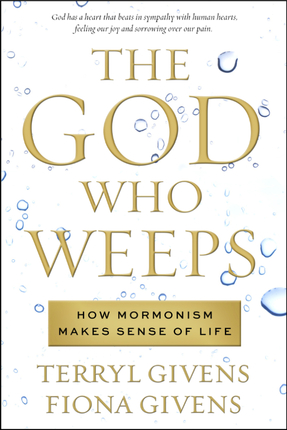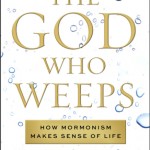A couple of months ago, I had the opportunity to attend a baptism of a new convert to the LDS church. Adult baptisms almost always make me weepy, because it’s so beautiful to see an adult freely choose to take upon them the name of Jesus Christ and become a Christian.
At this baptism, our bishop spoke to the woman who was baptized and welcomed her into the LDS church and our ward. He told her that studying the truths of the Gospel of Jesus Christ isn’t so much a learning process as it is an awakening of memories. Our spirits know these truths, and the Holy Ghost helps us to unearth these memories, long forgotten in our mortal journey.
Reading THE GOD WHO WEEPS, by Terryl and Fiona Givens, felt much like a remembrance of principles and truths I’d learned in another time. In fact, one of the passages that reminded me of my bishop’s words was the statement from the book “We never feel at home in this world…because we sense we carry within us clues to our origins.” followed by “We bring the grammar of sacred things with us.”
As a feminist, I appreciate the loving and thoughtful discussion of Ruth’s courage in being vulnerable, Mary’s heroism in welcoming her role as the mortal mother of the Son of God, and Eve’s cogitative “pursuit of the Good, the True, the Beautiful.”
As a co-parent of five children, I believe parenthood is meant to give us the tiniest glimpse of the love God has for us. There is no greater joy I can experience than when I hear the delighted laughter of my children. There is no greater sorrow I experience than being a bystander to the struggles of a child who suffers the consequences of bad choices, either their own or at the hands of others. My heart is filled with peace and the whisperings of my kinship with our Heavenly Parents when I see my children love each other, without reservation or agenda. It is in those moments, that I am reminded God experiences those same feelings for His children, albeit on a much grander scale, unencumbered by the trappings of an ephemeral reality.
THE GOD WHO WEEPS is a reminder that “that which is earthly conform[s] to that which is heavenly.” Much like the joy and sorrow I experience as a mother, God feels the same for me and for every other person on earth, but on a much deeper and grander scale.
I expected to pick up the book and devour it at once, but I was unable to do so. The text is rich with poetry and literary citations that forced me to put it down every few pages and ponder on what I’d read. It is a challenging book to read, but is a text I will return to again and again as I strive to recover the memories of my spirit and gain a greater understanding of the relationship God yearns to have with me.
______________________________________________________________________________________________________________
For those interested, here are some podcasts in which the Givens’ are interviewed:
This is the link to a five-part, five-hour interview of just Dr. Terryl Givens. It was done in September of 2011: http://mormonstories.org/terryl-givens-an-approach-to-thoughtful-honest-and-faithful-mormonism/
This is a link to a two-part, nearly three-hour interview with both Fiona and Terryl given. It was done this month: http://mormonstories.org/fiona-and-terryl-givens-and-the-god-who-weeps/
This is a wonderful discussion with three of the strongest, most articulate female voices in Mormonism: Fiona Givens, Joanna Brooks and Jana Riess. It was hosted by Dan Wotherspoon and was done earlier this month: http://mormonmatters.org/2012/11/14/139-a-beautiful-vision-of-mormonism/
Here is a link to a Q&A with the Givens’ in which rationalfaiths.com was invited. Paul Barker represented the blog. The sound quality isn’t super good because Paul recorded it on his i-phone; still quite enjoyable though: http://rationalfaiths.com/q-a-with-terryl-and-fiona-givens/
This is a link to a one-hour interview with both Fiona and Terryl Givens. It was done earlier this month: http://athoughtfulfaith.org/2012/11/08/010-terryl-fiona-givens-faith-doubt-and-the-god-who-weeps/







Jerilyn,
Beautiful review. Here are some of my favorite parts of the book:
“A supreme deity would no more gift us with intellect and expect us to forsake it in moments of bafflement, than He would fashion us eyes to see and bid us shut them to the stars,” (pg. 4)
It harkens back to Galileo’s 1615 letter to the Grand Duchess Christina: “I do not feel obliged to believe that the same God who has endowed us with senses, reason, and intellect has intended us to forgo their use and by some other means to give us knowledge which we can attain by them.”
OK, another favorite part from the book: “Evidence does not construct itself into meaningful patterns. That is our work to perform.” (pg. 9) It too often seems that the prevailing thought in our culture is that evidence is proof, or “the evidence speaks for itself.” Neither is true. Very little can be truly proven 100%. We can find evidence that leads us to a certain belief, but very rarely does evidence force us to believe, or not believe, something or in something.
Last one: “If we fall short of salvation, it will be because our cumulative choices, our freely made decision to reject His rescue, have put us beyond His reach, not because His patience has expired.” (pg. 101) This speaks to me at a deep, inexpressible level as a parent.
Thanks Jerilyn
I haven’t read this but your review made me want to. I just went and added it to my “to read” list! Thanks 🙂
The passages that you and Mike quoted from the book are beautiful. I’ve always felt, like you, that I was allowed to have children of my own so I could understand in some small way Gods love for us. Great review!
This book looks wonderful but I especially loved reading the review. It’s amazing the insight we can glimpse from each other’s expressions of faith and love. Thank you again for allowing us this opportunity.
Tana,
I finished the last 15 pages tonight; the last five I read out-loud to Cathy. Magnificent. This book is magnificent. It is by far the best, most expansive, forward thinking book about LDS theology that has come out in a very, very, long time – maybe even ever.
Our Mormon God who freely weeps is a God I can freely worship.
That was a really good review, I have yet another book to read.